Abductive arguments - Study guides, Class notes & Summaries
Looking for the best study guides, study notes and summaries about Abductive arguments? On this page you'll find 36 study documents about Abductive arguments.
Page 3 out of 36 results
Sort by
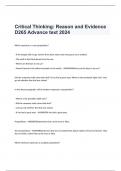
-
Critical Thinking: Reason and Evidence D265 Advance text 2024
- Exam (elaborations) • 31 pages • 2024
- Available in package deal
-
- $12.99
- + learn more
Which sentence is a non-proposition? - If the burglar did not go out the front door, they must have gone out a window. - The earth is the third planet from the sun. - Where are the keys to my car? - Mount Everest is the tallest mountain in the world. - ANSWERSWhere are the keys to my car? Did the company really close that deal? It has had a great year. Where is the president right now? Let's go ask whether the deal was closed. In the above paragraph, which sentence expresses a propo...
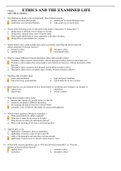
-
Miami Dade College, Miami PHI 2604/ PHI2604 Proctored Final Exam_ Latest Fall 2022
- Exam (elaborations) • 30 pages • 2021
-
- $15.49
- 2x sold
- + learn more
Chapter 1 ETHICS AND THE EXAMINED LIFE MULTIPLE CHOICE 1. Not thinking too deeply or too systematically about ethical concerns a. isolates you from other people. c. ensures that no moral dilemmas arise. b. undermines your personal freedom. d. helps guide you to moral truth. 2. Which of the following is the overall point of the author’s discussion of “doing ethics”? a. Doing ethics is difficult, but not doing it is foolish. b. Doing ethics requires many years of careful study. c. Mo...
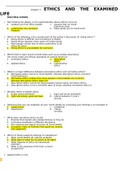
-
Miami Dade College, Miami PHI 2604/ PHI2604 Proctored Final Exam Latest Fall 2022
- Exam (elaborations) • 45 pages • 2021
-
- $12.69
- 1x sold
- + learn more
Chapter 1 ETHICS AND THE EXAMINED LIFE MULTIPLE CHOICE 1. Not thinking too deeply or too systematically about ethical concerns a. isolates you from other people. c. ensures that no moral dilemmas arise. b. undermines your personal freedom. d. helps guide you to moral truth. 2. Which of the following is the overall point of the author’s discussion of “doing ethics”? a. Doing ethics is difficult, but not doing it is foolish. b. Doing ethics requires many years of careful study. c. Most peopl...
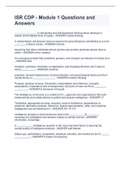
-
ISR CDP - Module 1 Questions and Answers
- Exam (elaborations) • 5 pages • 2022
-
- $9.99
- + learn more
________ ________ is self-guided and self-disciplined thinking which attempts to reason at the highest level of quality - ANSWER critical thinking A critical thinker will discover ways to improve its surroundings by contributing to a more ________ civilized society - ANSWER rational Assuming that other individuals will act just the way another particular person does is called - ANSWER mirror imaging An unconscious belief that conditions, governs, and compels our behavior is known as a -...
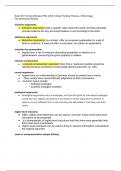
-
Exam #3: Format & Review PHIL 2303: Critical Thinking Thomas J. Brommage Fall 2023 Exam Review
- Class notes • 4 pages • 2024
- Available in package deal
-
- $7.99
- + learn more
The third exam for PHIL 2303: Critical Thinking, taught by Thomas J. Brommage, will cover various topics related to critical thinking. Inductive arguments are claims about the world that provide evidence for why we should believe or act according to the claim. On the other hand, abductive arguments offer proposed explanations for a set of facts or evidence. Induction by enumeration involves generalizing from a set of instances describing properties or relations. Reductio ad absurdum argues again...

-
Chapter 3 (arguments)
- Class notes • 5 pages • 2024
- Available in package deal
-
- $7.99
- + learn more
Arguments are collections of statements that are used to logically support a specific point. They consist of premises, which justify the conclusion, and the logical form that connects the premises to the conclusion. Premises and conclusions are statements that are declarative in grammatical form, factual, and in principle verifiable. Certain words or phrases, known as "tell words," can be used to identify whether a statement is a premise or a conclusion. Common tell words include "therefor...
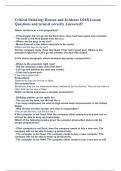
-
Critical Thinking: Reason and Evidence D265(Lesson Questions and terms)Correctly Answered!!
- Exam (elaborations) • 30 pages • 2024
-
- $17.99
- + learn more
Critical Thinking: Reason and Evidence D265(Lesson Questions and terms)Correctly Answered!! Which sentence is a non-proposition? - If the burglar did not go out the front door, they must have gone out a window. - The earth is the third planet from the sun. - Where are the keys to my car? - Mount Everest is the tallest mountain in the world. Where are the keys to my car? Did the company really close that deal? It has had a great year. Where is the president right now? Let's go ask whe...
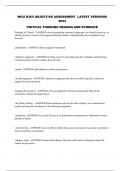
-
CRWGCRWGU D265 OBJECTIVE ASSESSMENT LATEST VERSIONS 2024 ITICAL THINKING REASON AND EVIDENCE
- Exam (elaborations) • 20 pages • 2024
-
- $8.49
- + learn more
Principle of Charity - ANSWER when interpreting someone's argument, we should always try to identify the best version of the argument that the author could plausibly have intended to put forward. inductive argumen proposition - ANSWER theory argument statement t - ANSWER Creating a case by providing specific examples and drawing a conclusion based on the evidence they provide sound - ANSWER valid deductive with true premises invalid argument - ANSWER a deductive argument that does...
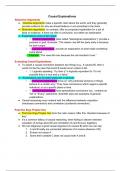
-
Unit 7 Causal Explanations
- Class notes • 2 pages • 2024
- Available in package deal
-
- $7.99
- + learn more
Causal explanations are different from inductive arguments as they provide explanations rather than conclusions. There are two types of explanations: reason explanations and causal explanations. Reason explanations provide a purpose or goal, while causal explanations explain what caused something to happen. When evaluating causal explanations, it is important to consider the difference between causation and correlation. A fallacy of causal reasoning is Post Hoc Ergo Propter Hoc, which fails to d...
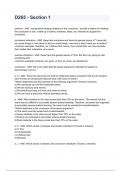
-
D265 - Section 1
- Exam (elaborations) • 7 pages • 2023
- Available in package deal
-
- $8.49
- + learn more
D265 - Section 1 premise - ANS a proposition lending credence to the conclusion ; provide a reason for thinking the conclusion is true ; made up of claims, evidence, ideas, etc. intended to support the conclusion conclusion indicators - ANS these feel conclusive and have the general sense of "I have told you some things or I am about to tell you some things, now here is what I want you to believe" -common examples: therefore, so, it follows that, hence, thus, entails that, we may co...

That summary you just bought made someone very happy. Also get paid weekly? Sell your study resources on Stuvia! Discover all about earning on Stuvia


